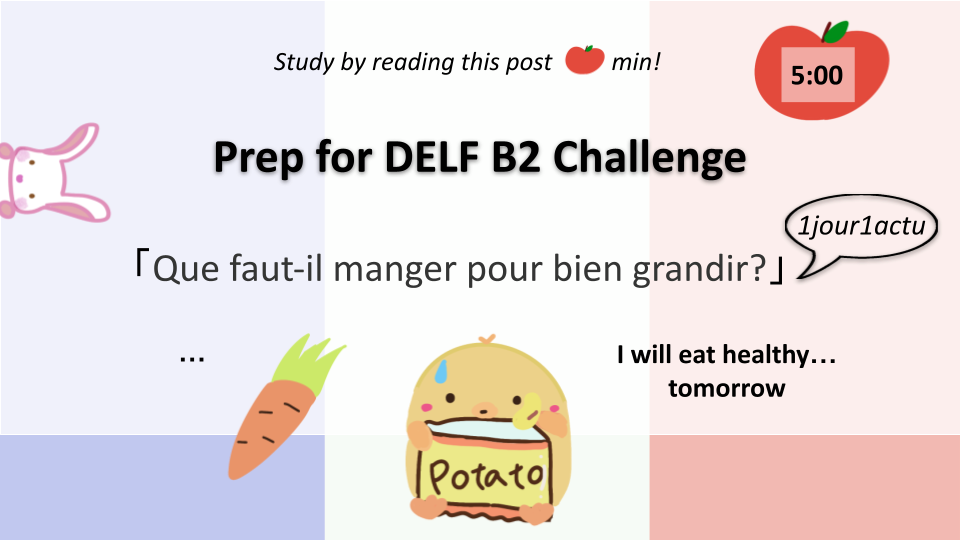🥦【DELF B2 Prep in 5-min】Learn Nutrition & French from 1jour1actu

My DELF B2 Preparation Blog – Listening & Writing Practice
This post is 5 minutes read time. Aiming for studying by just reading!
Learning French Through Real Topics: Que faut-il manger pour bien grandir?– 1jour1actu
Today’s blog post is a delicious mix of nutrition and French learning! Based on an article from 1jour1actu, this lesson helps you master vocabulary and grammar for DELF B2 while learning basic nutrition tips that are useful not just for kids, but for adults too. Yes, eating well and learning French can go hand in hand!
📌Today’s Key Sentence|Let’s read and understand the original
Aucun aliment n’est vraiment mauvais… à condition de ne pas en abuser !
Translation 👉 :
No food is truly bad… provided you don’t overdo it!
🔍 Vocabulary & Grammar Breakdown
| French | Translation | Explanation |
|---|---|---|
| Aucun aliment | No food | “Aucun(e)” means “none” or “not any” and is a strong negation. |
| n’est vraiment mauvais | is truly bad | “ne … vraiment” gives emphasis to the negation. |
| à condition de | provided that | Fixed phrase meaning “on the condition of”; always followed by an infinitive. |
| ne pas en abuser | not to overdo it | “abuser de” requires “en” as a pronoun for the object introduced by “de”. |
📚Vocabulary Boost
| Expression | Meaning | Notes |
| équilibré | balanced | Often used for meals: “un repas équilibré” |
| piocher | to pick (from a set) | Informal; useful in contexts like food choices |
| légumineuses | legumes | Includes beans, lentils, chickpeas |
| grignotage | snacking | Often discouraged in nutrition advice |
| charcuterie | cold cuts / processed meat | Includes ham, salami, etc. |
| se faire plaisir | to treat oneself | Common in lifestyle and wellness contexts |
| abuser (de) | to overdo/overuse | Used negatively: “ne pas abuser des bonbons” |
| craquer (pour) | to give in to / indulge | Can mean giving in to temptation (like fries!) |
| varier | to vary | Essential for balanced diets; “varier ses repas” |
| écouter son corps | listen to your body | Idiomatic; very common in health topics |
🔧 Grammar Focus | Key Structures for B2
🔹 Structure: Aucun(e) + nom + ne + verbe
- Meaning: No [noun] + verb
- Use in writing: To strongly deny the existence or validity of something
✅ Example:
- Aucun aliment n’est vraiment mauvais.
→ No food is truly bad.
🔹 Structure: à condition de + infinitif
- Meaning: Provided that / on the condition of doing something
- Use in writing: To express a prerequisite or condition for an action
✅ Example:
- À condition de ne pas en abuser.
→ Provided that you don’t overdo it.
🔹 Structure: en abuser (abuser de + nom)
- Meaning: To overuse or abuse something
- Use in writing: Shows mastery of pronominal usage; useful in formal or persuasive writing
✅ Example:
- Il ne faut pas en abuser.
→ You must not overdo it.
🔹 Structure: Ni trop… ni trop… ni trop…
- Meaning: Neither too [this] nor too [that]
- Use in writing: Great for slogans or structured arguments
✅ Example:
- Ni trop gras, ni trop salé, ni trop sucré
→ Not too fatty, not too salty, not too sugary
📘 Essay Expressions | Ready-to-Use Phrases
| French Expression | Example in French | English Translation |
| Il est important de… | Il est important de varier ses repas. | It is important to vary your meals. |
| Il faut éviter de… | Il faut éviter de grignoter entre les repas. | You should avoid snacking between meals. |
| Manger équilibré signifie… | Manger équilibré signifie consommer des aliments variés. | Eating balanced means eating various foods. |
| On peut se faire plaisir… | On peut se faire plaisir, mais sans abuser des sucreries. | You can treat yourself, but don’t overdo it. |
| Écouter son corps… | Écouter son corps est essentiel pour rester en bonne santé. | Listening to your body is essential to stay healthy |
🖋️ Practice Writing | Short Essay Prompt
Sujet : Que signifie « manger équilibré » et pourquoi est-ce important pour les jeunes ?
(What does “eating a balanced diet” mean and why is it important for young people?)
✍️ Model Answer (DELF B2 style):
🔹Introduction
Aujourd’hui, on parle beaucoup de l’alimentation équilibrée, surtout chez les jeunes. Mais que veut dire exactement « manger équilibré » ?🔸Développement 1
Manger équilibré signifie fournir à son corps les éléments dont il a besoin : fruits, légumes, protéines, céréales et produits laitiers. Chaque groupe d’aliments joue un rôle essentiel dans la croissance.🔸Développement 2
Ce qui est important, c’est aussi d’éviter les excès : trop de sucre, de sel ou de matières grasses peuvent nuire à la santé. Cela ne veut pas dire qu’on ne peut jamais manger de bonbons, mais il faut savoir modérer.🔹Conclusion
En résumé, bien manger est une manière de prendre soin de soi. Cela permet non seulement de bien grandir, mais aussi de se sentir bien dans son corps.
Translation:
🔹Introduction
Today, we often talk about eating a balanced diet, especially for young people. But what exactly does it mean to “eat balanced”?
🔸Development 1
Eating balanced means giving your body what it needs: fruits, vegetables, proteins, cereals, and dairy products. Each food group plays an essential role in growing up.
🔸Development 2
What’s important is to avoid excess: too much sugar, salt, or fat can harm your health. That doesn’t mean you can never eat candy, but you should be moderate.
🔹Conclusion
In summary, eating well is a way to take care of yourself. It allows you not only to grow well but also to feel good in your body.
✅ Test Yourself | Final Quiz
Q1. Which of the following correctly uses “aucun” for negation?
a) Aucun enfants aiment les légumes.
b) Aucun enfant n’aime les légumes.
c) Aucun des enfant aime les légumes.
Q2. What does “à condition de” require grammatically?
a) A noun
b) A past participle
c) An infinitive verb
Q3. Which sentence correctly uses the pronoun “en” with a verb that takes “de”?
a) Il faut en abuser.
b) Il faut en manger.
c) Il faut en écouter.
Answer
Q1. a) a sample
Q2. c) lors de
Q3. b) To ensure the preservation of the oceans
Q1. b) Aucun enfant n’aime les légumes.
Q2. c) An infinitive verb
Q3. a) Il faut en abuser.









Leave a Reply